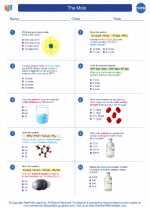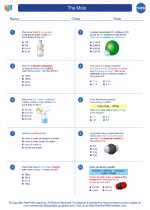Bases in Chemistry
In chemistry, bases are substances that can accept protons or donate electron pairs. They are the opposites of acids and are an essential part of understanding chemical reactions and pH levels.
Properties of Bases:
- Bitter taste
- Slippery or soapy feel
- Turn red litmus paper blue
- React with acids to form salts and water
- Conduct electricity when dissolved in water
Common Examples of Bases:
- Sodium hydroxide (NaOH)
- Potassium hydroxide (KOH)
- Calcium hydroxide (Ca(OH)2)
- Ammonia (NH3)
- Aluminum hydroxide (Al(OH)3)
Important Concepts:
One important concept related to bases is the pH scale. Bases have a pH greater than 7. They can neutralize acids and are often used to balance the pH in various chemical and biological systems.
Study Guide:
To understand bases better, it's important to:
- Learn the properties and characteristics of bases.
- Understand how bases react with acids and the products of these reactions.
- Memorize common examples of bases and their chemical formulas.
- Practice calculating pH and understanding the relationship between acids and bases on the pH scale.
- Study the applications of bases in various industries and everyday products.
By mastering these concepts, you'll have a solid understanding of bases and their significance in chemistry.
.◂Chemistry Worksheets and Study Guides High School. The Mole
The resources above cover the following skills:
Chemistry II
Reactions
Use mathematical representations to analyze the proportion and quantity of particles in solution.
Equilibrium
Analyze and interpret data to explain the change in concentration of products and reactants, and the stable state achieved under reversible conditions.



